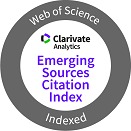La recuperación industrial del Aglomerado Gran Rosario a inicios del siglo XXI
DOI:
https://doi.org/10.35305/s.v0i1.3Keywords:
Industrial dynamics, Real Exchange Rate, CompetitivenessAbstract
The change of the macroeconomic environment that started with the devaluation of 2002 originated a process of deep recovery in the national and regional industry. This process took place after a significant fall of the industrial share in the productive structure, due to two decades of unfavourable policies that ended in one of the most serious economical crisis. The 2002 devaluation meant a turning point for the industrial performance. At this context of high real exchange rate, the industrial recovery was driven by price-competitiveness. Although the change in the macroeconomic context is a necessary condition, this is not sufficient to make a sustainable growth that tends to major development. In this sense, since 2005, the increase of the price level began to erode, in a sustained way, the competitiveness of the real exchange rate through the increment in the industrial costs. Because of the industrial sector led the economic recovery in the Rosario Region, this paper seeks to analyze the characteristics of the industrial growth in Rosario and its metropolitan area since the devaluation. It also examines the evolution of some indicators related to industry price competitiveness that can affect the future industrial performance.Published
2009-06-17
How to Cite
Báscolo, P. J., Ghilardi, M. F., & Secreto, M. F. (2009). La recuperación industrial del Aglomerado Gran Rosario a inicios del siglo XXI. SaberEs, (1). https://doi.org/10.35305/s.v0i1.3
Issue
Section
Artículos














